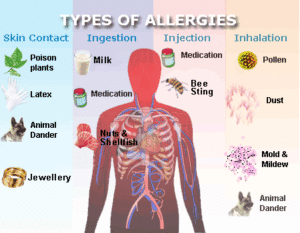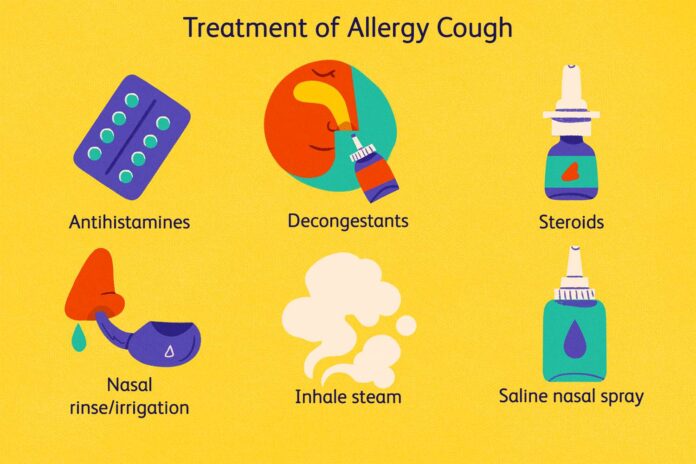Allergies are a frequent medical problem that develops when the immune system overreacts to normally harmless chemicals. Pollen, dust mites, pet dander, particular foods, insect stings, and specific drugs are examples of these compounds, which are referred to as allergens.
An allergic person’s immune system responds excessively when they come into contact with an allergen, releasing histamine and other substances into the circulation. This may result in a number of symptoms, including.
Sneezing, a runny or congested nose, itching in the nose or throat, and watery eyes are all signs of hay fever (allergic rhinitis). Hay fever is frequently seasonal and brought on by weeds, grasses, or tree pollen.
asthma caused by allergies: Asthma is a chronic illness marked by inflammation and airway constriction. Pollen, dust mites, mould, or pet dander are among allergens that can cause asthma symptoms like wheezing, coughing, shortness of breath, and tightness in the chest.
Food allergies: Some people may experience allergic reactions to particular foods. Peanuts, tree nuts, milk, eggs, wheat, soy, fish, and shellfish are among the common food allergies. From minor (itchy skin, hives) to severe (difficulty breathing, swelling, anaphylactic) symptoms are possible.
Eczema (atopic dermatitis), hives (urticaria), and contact dermatitis are all signs of skin allergies. Hives often manifest as raised, itchy welts on the skin, whereas eczema is characterised by red, itchy, and inflamed skin. When an allergy or irritant comes into direct touch with the skin, contact dermatitis results, producing a localised rash.
Allergies to insect stings: Some people may experience life-threatening allergic reactions to stings from bees, wasps, hornets, or fire ants. These responses can result in breathing difficulties, hives, swelling, itching, and, in extreme circumstances, anaphylaxis.
Antibiotics (such as penicillin), nonsteroidal anti-inflammatory medicines (NSAIDs), and anticonvulsants are among the treatments that can cause adverse responses in certain persons. Mild rashes to severe responses like anaphylaxis are all possible symptoms. Before beginning a new medication, it’s critical to let your doctor know if you have any known drug sensitivities.
Conjunctivitis allergica: This is an allergic eye reaction. It typically results in the conjunctiva’s (the transparent tissue lining the eyelids and covering the white area of the eye) redness, itching, watering, and swelling. Pollen, dust mites, pet dander, and specific eye drops or cosmetics are some examples of common causes.
Some people experience occupational allergies as a result of exposure to certain substances at work. Healthcare professionals may be allergic to latex, whilst hairdressers may become allergic to chemicals or hair dyes used in their line of work. Depending on the allergen, symptoms can include skin rashes, breathing problems, or eye irritation.
Seasonal allergies, also referred to as hay fever or seasonal allergic rhinitis, are allergies that manifest themselves at particular periods of the year when certain plants release pollen into the atmosphere. Tree pollen in the spring, grass pollen in the summer, and weed pollen in the autumn are typical triggers. Sneezing, congestion, itchy eyes, and a runny nose are a few symptoms that can occur.
Cross-reactivity: When the proteins in one allergen and another are similar, the immune system reacts to both of them, resulting in cross-reactivity. For instance, if a person has a ragweed allergy, eating specific fruits or vegetables like melons, bananas, or zucchini may also cause symptoms. Oral allergy syndrome is the term for this.
Remember that allergies can range in intensity from minor to potentially fatal. Anaphylaxis, or severe allergic reactions, can result in loss of consciousness, trouble breathing, a drop in blood pressure, a rapid heartbeat, and other symptoms. People who are at risk for anaphylaxis may carry an epinephrine auto-injector (such an EpiPen) to manage an emergency reaction. Anaphylaxis necessitates prompt medical intervention.
Consult with an allergist or immunologist if you believe you have allergies or if you’ve ever had a severe allergic reaction. To assist you in avoiding triggers and successfully managing your symptoms, they can perform in-depth allergy testing, offer a correct diagnosis, and create a management plan just for you.

































